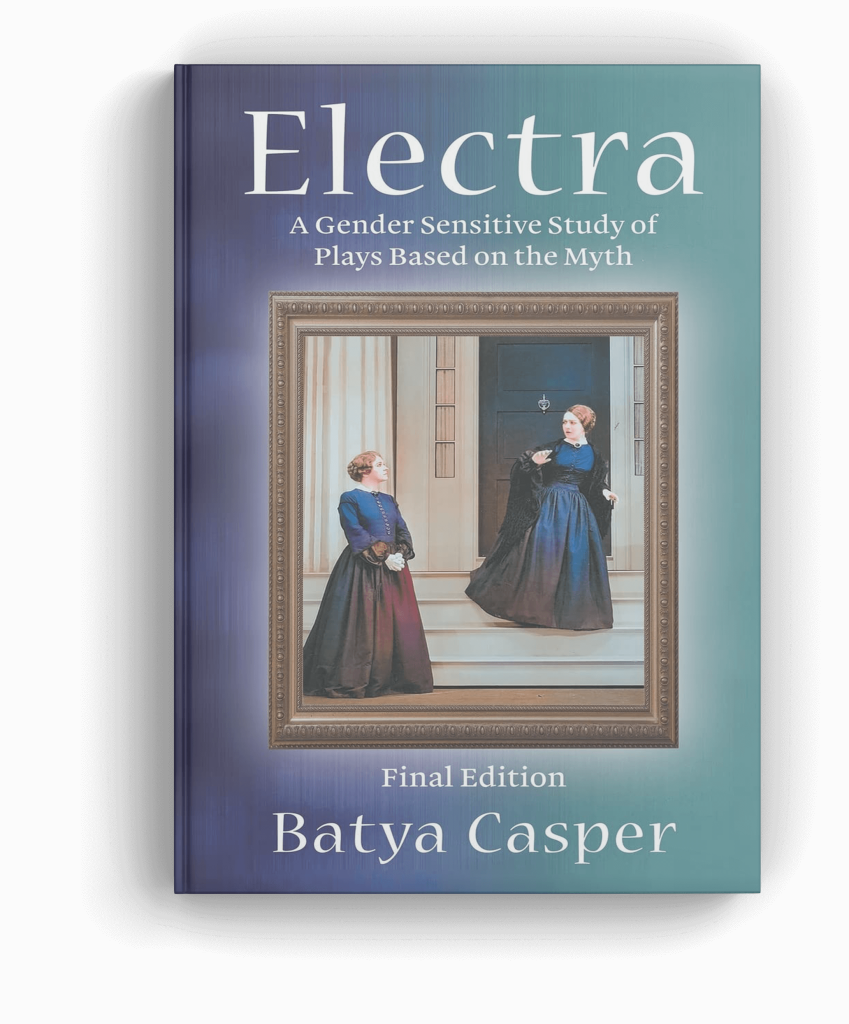About the book

Electra: A Gender Sensitive Study of the Plays Based on the Myth: Final Edition
Shakespeare’s Hamlet – written 2,000 years after the classical Greek period – follows a narrative pattern similar to that of the Greek Electra myth, and it isn’t the only story to do so. We see signs of Electra’s influence again in the 20th-century works of Oscar Wilde, Eugene O’Neill and T.S. Eliot, among others. This revised and updated edition looks more closely at the influence of Electra on popular culture throughout history and the questions it poses regarding oppositions such as logic versus instinct, night versus day and repression versus freedom.
Excerpt
… as Daifa was coming out of her room, before she’d even combed her hair, Ibrahim told her that a Palestinian friend of his had been in our home looking for her.
“He wants to bring his son to see you this evening.”
my… feisty, strong-willed daughter who has always refused to be “matched up” … mumbled, “Sure, why not?”
“’Why not?’ That’s it? Daifa, this will be no casual acquaintance,” I squawked. “The man wants you to marry his son.”
“Yes, Ommy. I’ve met his son. Abee introduced me to him last month when you were collecting your paycheck in Jerusalem.”
“Daifa, it’s not you this man wants. He’s a member of the Palestinian Liberation Organization. He has an agenda. He doesn’t have citizenship.”
“If I marry him, he will. If I were to marry him I could work with him. Be part of something larger than myself.”
Wadha was standing in the doorway sewing a button on her shirt, watching our scene play itself out. Ibrahim was hiding behind the newspaper, my newspaper, the one I write for. Bastard, I thought, he’s not going to help me here, not say a word. He’s simply going to eat his omelet while I breakfast on heartburn.
“Can you hear what you are saying?” trampling the feta cheese over my bread with my fingers, forcing my voice to remain in a regular key. “These men are angry, dangerous even. You are a woman, Daifa, with human being needs, women’s needs, not a political pawn.”
“Ommy, why are you so worked up? I know what I’m doing. I told you, I’ve met him. He’s nice. Besides, where is the ‘think for yourselves, make your own decisions’ mother that brought us up? The one we’ve always been so proud of? Just words, right? When push comes to shove, parents never mean what they say.”
“I always mean what I say, Daifa. I want you to choose a life of love, of joy, not violence, not danger.”
“Other mothers would be proud to have a daughter who wants to help our people. If I marry that man, that’s what I’ll be doing. Helping.”
I pulled my shawl from the hall closet, banged the door behind me, picked my way through the early morning mist to Adiva, our sweet, aging mama goat. I sat on a rock near her as she lay in her stall, as she ruminated on her straw.
What have I done? I paced the stubble ’round and ’round my mamma goat’s bed till I was sure I’d made her dizzy. I tried to force my brain to work out what it was I’d done, but I couldn’t. What have I done to my children?— My brain, like an automaton, refusing to punch out its message. I tried to think what I should do from that point on, but no, nothing would come out of me but, What have I done to my children? Adiva was no help. She’d given up on me way back, when I gave away her first litter; when I first started stealing her milk for cheese. Despite my efforts to be different from the way my mother parented me, despite the pride I’d taken in the example I thought I was setting, I’d failed my children, had guided them to the brink of disaster.
I can’t appeal to Ibrahim, I thought. So much I can’t tell him. A giant mound of desert sand has grown between us, a Middle Eastern Becket play. Huge. Smelling of feuds, daggers, camels. There’s no way I can move around it, I told myself. Sand in the bathroom, in the kitchen, in the food I eat, invisible, but there just the same. Taboo. Observed by both of us, like vultures hunched on a tree, waiting. I couldn’t hold another thought in my aching head.
I fell in love with Ibrahim while discussing politics, challenging differences. Now, I thought, all we have to talk about is the weather, or what time he’ll come home at night. God or Allah or Pan or whoever it is that supplies married couples with words, didn’t give us enough, not the right kind, not the gentle, wise kind. All I could think of was my absent son and the dark secret in the shed. Orit hardly pops into my head anymore.




